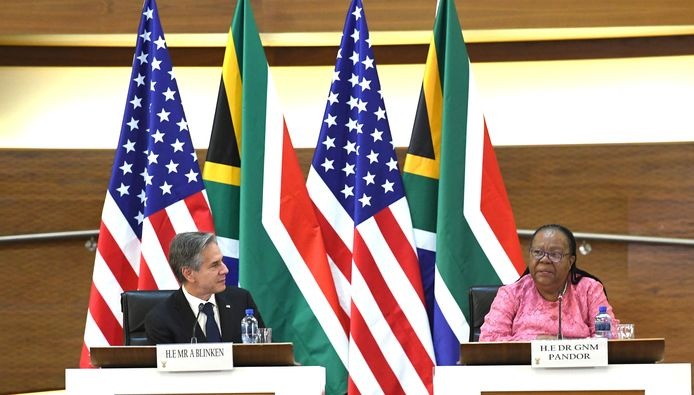After Russia and France, it is America’s turn to woo Africa.
On Sunday August 07, 2022, US Secretary of State Anthony Blinken arrived in South Africa to begin an African diplomatic tour, his second since taking office in 2021.
This meeting with the South African government aims to strengthen America’s political and economic ties with Africa to curb the growing influence of Russia and China, which for some years have been the main diplomatic partners of several African countries including South Africa, the continent’s economic giant.
This visit began with the visit of the American Secretary of State to the Hector Pieterson memorial near Soweto in Johannesburg, to honor the victims of apartheid.
As a reminder, at the end of last July, Russian Foreign Minister Serguei Lavrov paid a visit to Congo Brazzaville, Uganda, Egypt and Ethiopia while simultaneously French President Emmanuel Macron was also touring Cameroon, Benin and then in Guinea Bissau.
The Russian government is trying to reassure its African partners in the face of what is described by the UN as the most “serious food crisis” of this decade. The Russian Foreign Minister said during his July 23 visit to Cairo, Egypt: “Russian grain exporters will meet all their obligations”.
France, for its part, having seen its influence gradually diminish over the years to the benefit of Russia and China, undertook this visit by its Head of State with the intention of establishing a new policy aimed at bringing the France of its traditional African allies.
It is therefore now America’s turn to embark on what seems to be a race to conquer Africa, and if this tour begins with South Africa it is no coincidence because, since the start of the Russian invasion of Ukraine on February 24, the South African government maintained a neutral stance, refusing to join the call of Western countries to condemn Russia.
Thus, according to Fonteh Akum, head of the think tank Institute for Security Studies, based in Pretoria, this visit of the American Secretary of State aims to bring South Africa closer to the Western camp in the new African strategy of the United States.
Since 2011, South Africa has been part of the BRICS which is a group made up of Brazil, Russia, India and China. Together, these countries represent more than 40% of the world’s population and 27% of the world’s GDP. In recent years, these countries have become increasingly important on the international scene thanks to rapid economic expansion which has further increased the weight of their policies, but also because they have taken strong measures in terms of social protection.
In June, Russian President Vladimir Putin urged the Brics to cooperate in the face of “selfish actions” by Western countries, amid unprecedented sanctions against Moscow over the Ukraine conflict.
This visit is therefore an opportunity for Mr. Blinken to inform African States that they are indispensable allies on the most essential issues of our time such as climate change, energy transition, food insecurity and global pandemics…
After South Africa, the Secretary of State must go to the DRC and then to Rwanda. The current political context between these two countries is increasingly delicate, in particular because of the DRC, which has accused Rwanda of destabilizing the east of the Democratic Republic of Congo for years. This situation appears to be a golden opportunity for America to relaunch its diplomacy.
What about China?
Solidly established on the African continent, some no longer hesitate to consider it a new colonial power.
The Chinese government carries out major infrastructure projects based on loans granted by Chinese state-owned enterprises.
In twenty years, trade between Beijing and the African continent has multiplied by twenty. However, many believe that the repercussions of Chinese investments have not benefited African populations.





